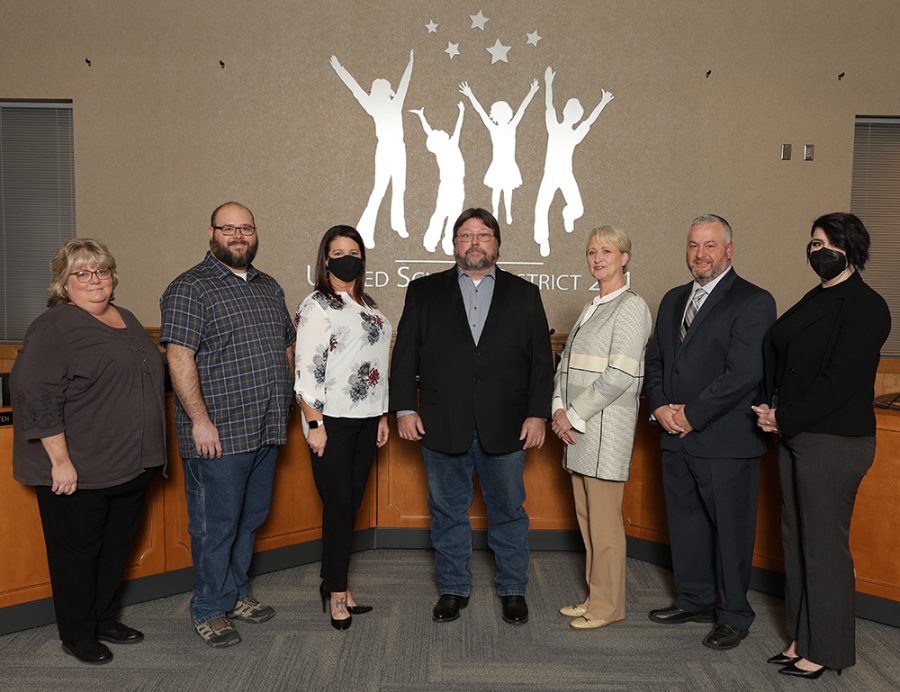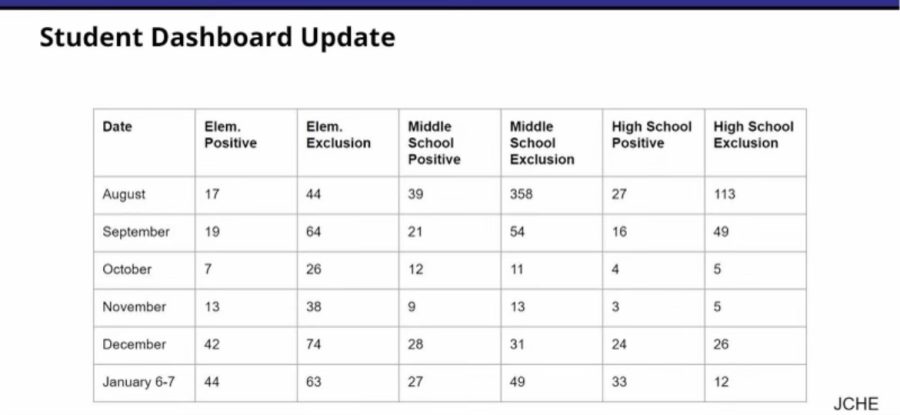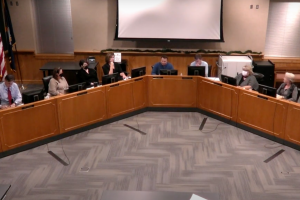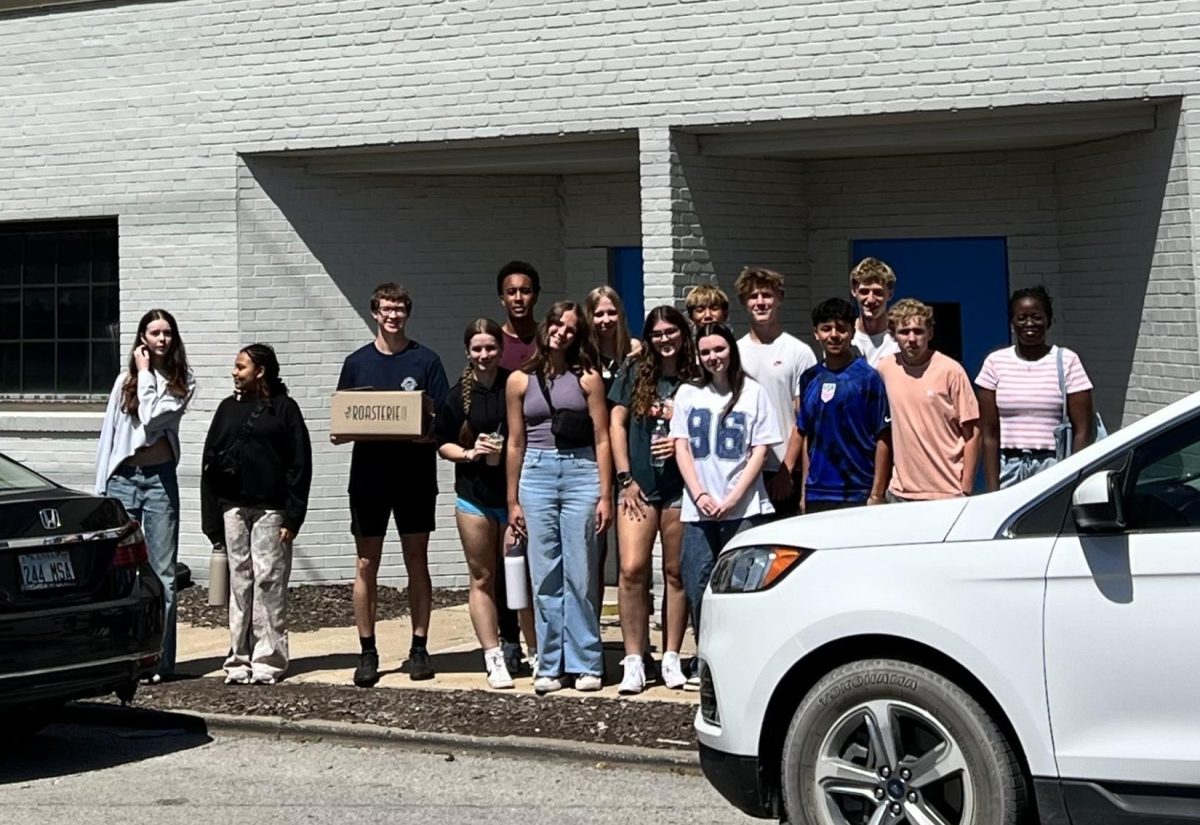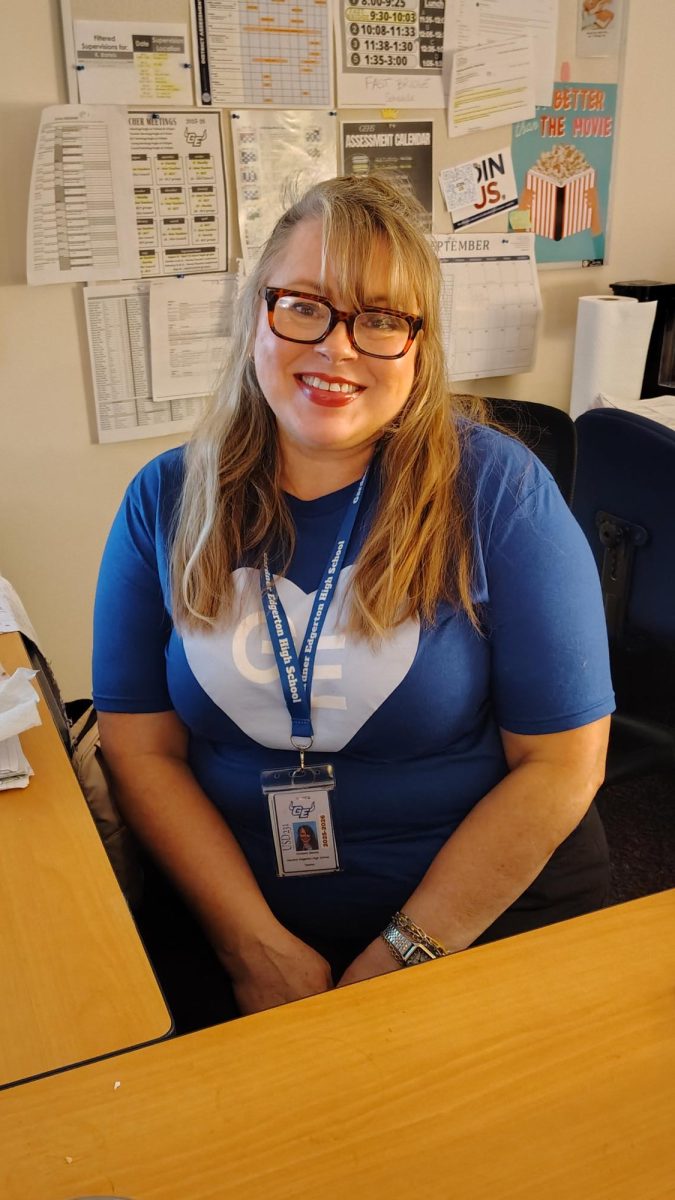Tense First School Board Meeting Ends With Naming Mark Meyer Interim Superintendent
On January 10, 2022, the Gardner Edgerton School District welcomed the new school board members with a tense BOE meeting. The meeting ended with naming Mark Meyer the interim superintendent.
Jan 14, 2022
On Monday, January 10, new school board members were welcomed to their positions with a tense first meeting which ended with naming former GEHS principal and current Director of Auxiliary Services Mark Meyer interim superintendent. Action items were approved relating to board leadership and special meetings to discuss the superintendent search and lawyer representation for the district, with further discussion over topics such as COVID’s strain on student and staff absences in the district.
To catch up: During the last board meeting on December 6, 2021, Pam Stranathan resigned from her position as superintendent through a separation agreement during a three-hour-long executive session. She had been in office since 2014. According to the Kansas City Star, a $425,000 severance package was granted to Stranathan, a deal which some called a “golden parachute.”
The school board also welcomed four elected members to the first meeting of their term: Lana Sutton, who was incumbent (already in office) and up for reelection this year, Greg Chapman, Thomas Reddin, and Jeff Miller.
A DIFFERENT AGENDA
Board meetings must be publicly announced and accessible. Usually, the upcoming board agenda is posted ahead of the meeting for the public to see what will be discussed. According to the Kansas Board of Regents bylaws, the agenda should be approved or altered at the beginning of the meeting. Typically, if a board member wants to further discuss an item included in the consent agenda (a package of information that all passes or fails at once without further discussion), they will move a single item into new business.
After formalities at the beginning of the meeting, board member Kristen Schultz announced she would like to approve the agenda. After this announcement, new board member Greg Chapman passed out a brand new potential agenda that had not previously been made public, asking the board to switch gears and discuss the items on his list. This led to tense interactions between returning and new board members.
“I’m not suggesting an amendment, I’m suggesting an entirely new agenda,” Chapman said. “I took…the budget hearing out of consent and put it in the new business and then some of the new businesses changed.”
Returning board members immediately expressed concern at the suggestion of a different agenda, explaining board members had the opportunity to add to the agenda prior to the meeting. Katie Williams, another member of the board, and Schultz said the new board members didn’t respond to their requests for agenda additions.
“According to Kansas stature, it only has to be presented to the public prior to the meeting location and time,” Chapman said. “Everything else can be decided by us if there’s other things we need to add or subtract…It’s really no different than adding and subtracting something, I just was nice enough to pre-make one.”
Although there was discussion back and forth, the new agenda was ultimately voted in, 4-3, with Miller, Reddin, Sutton, and Chapman supporting the new agenda.
“That’s not being transparent with the people if we just let them know, ‘Yeah we’re gonna have the meeting here’ unless there is no agenda,” board member Robin Stout said. “I came in here hoping we could work together. It was made clear we cannot.”
Schultz also expressed her concern and that new members didn’t submit agenda additions ahead of time.
“This is not very transparent. This feels like a game. The people out here that work for this district are better than us playing,” Schultz said. “I was trying to share an olive branch and say, ‘Hey, let’s work on this together and see what we can come up with.’ We don’t need to say it’s an impossibility….It’s clear that we are not going to be a united board here and we’re going to have to work through some of those things, which is very unfortunate for the people that we represent. So yeah, go ahead with the vote, and we will deal with that after the fact.”
ELECTIONS FOR NEW BOARD LEADERSHIP
Immediately after Chapman’s agenda was approved, nominating and voting in new leaders took place. Reddin made the motion to nominate Sutton as president, Chapman seconded and it was approved 4-3. Those who voted in favor were Chapman, Miller, Sutton, and Reddin. Those opposed were Schultz, Williams, and Stout. This split of voting continued through the first several votes of the board.
“When I walked in tonight, I had administrators very excited about the future, and that is awesome to see,” Sutton said after she took her position as president. “Our responsibility as a district is the education of these children.”
Elections for Vice President of the board then took place, with Reddin winning the seat, 4-3.
“Thank you to all who assisted in getting me elected, and those that voted me and trusted me, to represent you and your children’s education,” Reddin said. “I look forward to serving you for the next four years.”
DISCUSSION FOR SEEKING RFPs FOR LEGAL COUNSEL
Another new agenda item related to the district’s current legal counsel, meaning the attorneys that represent USD 231. Board President Lana Sutton opened the discussion for seeking an RFP (Request for Proposal) to find new attorneys to represent the district. After a pause, it was made known that this item was not on the original agenda, and some board members were confused regarding the addition.
“That’s something new…that wasn’t on the original agenda,” Schultz said.
Chapman explained the addition.
“I believe there was some frustration with the current attorneys,” Chapman said. “There were some concerns with who they represented instead of necessarily the board.”
However, Schultz, whose background is in family law, stated the attorneys don’t represent the board but the district.
“The council represents the district, not the board,” Schultz said. “They don’t represent us, they represent the school district.”
Sutton shut down both Schultz and Chapman by proposing that it was a good idea to keep in mind, if not a current pressing issue.
“I think this is something that would be worthwhile, to make sure we’re getting the best representation for the district,” Sutton said. “It would be open to any interested party.”
This item was concluded with financial data on how much the current attorneys are being paid being sent to all board members as a starting point for a new search.
“Would the board be comfortable if we gave you the information you were seeking by the end of the week?” Christi Whitter, Director of Elementary Education, asked. “And then at the next board meeting we can work as departments and have an RFP recommendation process?”
No votes were taken on this item.
CHANGING THE POLICY ON PUBLIC COMMENT
Before COVID-19 transformed the public comment sections into a place for infectious disease to spread, the policy in place was three minutes per comment, unlimited persons to comment. It has since been changed in an attempt to help board meetings not last for hours if public comments are repetitive. Chapman led the discussion on the review of the policy, and both Sutton and Reddin after being elected made it clear they would no longer “keep the doors [to the board meetings] closed.”.
“If we’re limiting the amount of people that can tell us how they feel… to me that doesn’t equal representation,” Chapman said.
Chapman proposed a new time limit and total cap of people allowed to comment.
“It would just be returning to pre-COVID standards,” Schultz said.
After reviewing the public comment policy (BCBI), Chapman proposed a motion to add a pause after actionable items in the agenda to allow public comment before a vote. Once Chapman had made his proposal, Schultz countered it.
“I think you’re doubling up…I am not comfortable with opening it up during a motion,” Schultz said. “It takes away from the business of the district, I don’t know if it’s typically done that way anywhere.”
Schultz pointed out the possibility of losing control of the board to the people if it becomes routine to comment before every item.
“I think City Council does a pretty good job of it,” Chapman said. “They can take those discussions and somebody out in the audience can say, ‘Hey, that’s actually not the best program out there.’”
Schultz then noted that the board listens to the district on the best programs, not necessarily the people in the audience.
“I’m not saying we don’t listen to our citizens, I’m saying that when it comes to education…we turn to the experts,” Schultz said. “Just because you run a business doesn’t mean you know finance of a school district.”
The board decided to leave the proposal for public comment before actionable items behind and voted on reverting back to the pre-COVID BCBI policy. The board voted 6-1, with Chapman against.
SEARCH FOR A NEW SUPERINTENDENT
Last year, Stranathan’s contract was renewed to 2023, ultimately ending in her resignation mid-term. Her resignation went into effect on January 9, 2022, and an interim superintendent was decided during Monday’s board meeting.
“I understand that we will, in executive session, need to discuss who would be the acting interim superintendent until we actually have an interim superintendent,” Sutton said.
Everyone agreed to participate in a discussion about an interim superintendent during the executive session. Four people met the qualifications for the position: Whitter (Director of Elementary Education), Jody Marshall (Director of Human Resources), Meyer (Director of Auxiliary Services), and Ben Boothe (Director of Community Relations).
“I would recommend using KASB [Kansas Association of School Boards] again to put that together as…someone non-related to the district right now until we get that superintendent search underway,” Schultz said. “They have a whole process that you can go through and they are the experts on choosing…I just think an outside source during this kind of volatile time in our culture might [be better].”
Chapman proposed the idea of a breakaway committee composed of board members to come up with ideas of what to agree on what they want in a superintendent and take it to a third party agency to help make a decision.
“We all want to be a part of this obviously, so maybe by a certain date, everyone could [compile a list] of what they’re looking for…and send it to those [four] people we obviously decide tonight on,” Chapman said.
Schultz proposed holding a special meeting amongst board members to decide the superintendent with KASB in attendance. Reddin then proposed a compromise, where Chapman’s committee would consist of a few board members using their ideas and public opinion of what the community wants in a superintendent before taking those ideas to KASB the next time they met. Sutton, Reddin, and Williams formed the committee. Other board members and administrators will email the committee their ideas as well. The special committee will meet on Jan. 18.
The board later went into an executive session to discuss the interim superintendent position.
After the executive session was held, Sutton made a motion to appoint Meyer as stand-in superintendent effective immediately after voting. It was a unanimous vote. Meyer will now serve as stand-in superintendent.
In an official statement released by the district, Meyer, who has been in USD 231 for over 20 years, expressed his gratitude.
“It is an honor to be appointed to this role. As we approach this new era in USD 231, we look forward to collaborating with the Board of Education as they search for our next Superintendent. I, and the other Directors, all stand ready to serve you,” Meyer said.
MARSHALL AND COLSTON PRESENT COVID STATISTICS
Chapman’s agenda that was voted for at the beginning of the meeting omitted a COVID presentation that was previously scheduled. The presentation would have been done by Ryan Colston, the contact tracer for the district, who would have called into the meeting via Zoom due to being COVID positive.
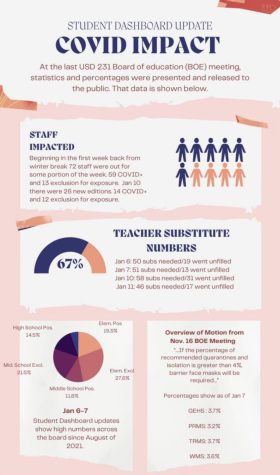
“Ryan was gonna present the COVID stuff tonight, where our numbers were at, and you took that off of here,” Schultz said. “Now our community has no idea where our numbers are or, you know, what that looks like for contact tracing…I’m sorry to be all over the place with this agenda, but I would like to hear where we’re at right now.”
Instead of Colston giving a presentation, Marshall told the board he had the information available. Schultz asked for him to present the information, which was not on the new agenda.
“Last week was the first week back after winter break,” Marshall said. “We had 72 staff out for some portion of the week; 59 of them were covid positive, 13 exclusions for exposure…I think that this is going to be a high spike and hopefully tails off pretty quickly, and the staff seem to cycle first, and then the students.”
Because Chapman’s agenda omitted the original presentation, Schultz asked the board whether or not Colston should be called into the meeting or not. They ended up calling him via Zoom. Once Colston was called in, he finished the presentation and between Colston and Marshall, they gave further statistics regarding student absences.
According to their presentation, 3.7% of high school students were absent due to COVID – either testing positive or being in quarantine according to the Johnson County Health Department guidelines. However, when asked about total absences, school district directors reported 21.7% of students at the high school were absent during that same period.
STUDENT REACTIONS
“I think that the meeting started out a little rocky but then it smoothed out towards the end,” sophomore Samantha Reddin, daughter of Thomas Reddin, said. “I believe we have some new board members that are definitely going to do great things to make our district much better and I think that they chose the appropriate people to lead us to be a better community.”
Sophomore Haylee Weese had an opposite opinion and thought that the meeting was hard to get through.
“The meeting felt very chaotic and stressful,” Weese said. “…I feel the board should be focused on the students and teachers, and what they can do to help this difficult time is to not be as overwhelming.”
Junior Hallie Sherman took a more neutral standpoint on the meeting.
“It seemed very divided and there wasn’t much compromising happening,” Sherman said.
To watch the board meeting, click here.
The next regularly scheduled board meeting will be Monday, Feb. 7, with a special meeting on Tuesday, Jan. 18.



